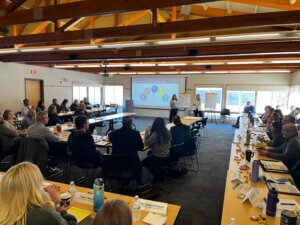Building a better path
November 12, 2025
| By La Crosse Community Foundation |
How the Mental Health Coalition is reimagining justice for people in crisis
 When someone in crisis encounters the justice system, the difference between care and punishment often comes down to understanding.
When someone in crisis encounters the justice system, the difference between care and punishment often comes down to understanding.
For too long, people living with mental illness have been met with handcuffs instead of help — landing in jail cells that were never designed for healing. The Mental Health Coalition of Greater La Crosse is working to change that.
With support from a microgrant from La Crosse Area Community Foundation, the coalition partnered with the justice system and county officials to convene a two-day Sequential Intercept Model Mapping Workshop earlier this year. The gathering brought together 61 participants — from law enforcement, health care, the courts, schools, county agencies, advocacy groups, and people with lived experience — to map how individuals with mental illness come into contact with the criminal-justice system and identify where intervention could lead to treatment instead of incarceration.
Understanding the need
“The jail is not the right place.”
“We know that our jail has become, by default, one of the largest mental-health facilities in our community,” said Diana DiazGranados, executive director of the Mental Health Coalition of Greater La Crosse. “And that’s not where people belong. They deserve care, not confinement.”
La Crosse County Circuit Judge Scott Horne has long championed efforts to decriminalize mental illness locally. The coalition’s workshop, facilitated by the National Center for State Courts and the first in a series of SIM workshops across Wisconsin, was built on years of groundwork by Judge Horne and others who have sought new ways to respond to behavioral-health crises.
How the Sequential Intercept Model works
Developed by Policy Research Associates and used nationwide, the Sequential Intercept Model offers a practical framework for change. It breaks down the criminal-justice process into “intercepts,” or points of contact — from the first crisis call to community reentry — and helps communities visualize where intervention can occur.
In La Crosse, the initial work centers on Intercepts 0 and 1 — community services and law-enforcement response — where early intervention can prevent a behavioral-health crisis from becoming a criminal-justice case.
Mapping hope — and practical solutions
“The idea was to get everyone at the same table and literally map where people with mental illness are coming into contact with the system,” DiazGranados explained. “From that, we can see where the gaps are and where we can do better.”
In La Crosse, that includes calls to 911, encounters with police, or interactions in schools. Thanks to partnerships the coalition has built over the years, local law enforcement already receives crisis intervention and Mental Health First Aid training.
“We’re fortunate to have officers who understand how to de-escalate a situation and connect people to help,” DiazGranados said. “But we need to go further — to create more consistent, community-wide systems of care.”
The workshop produced several focused work groups now meeting to implement recommendations and strengthen coordination among agencies. Discussions are exploring improved mental-health screening in the jail, enhanced diversion programs, and expanded crisis-response options for police, courts, and community partners.
A community that cares
“This community really cares about each other,” DiazGranados said. “When you see law enforcement, health professionals, advocates, and families all working together because they believe we can do better — it gives you hope that change is possible.”
She credits La Crosse Police Chief Shawn Kudron, a longtime member of the coalition’s board, for championing trauma-informed leadership.
“Under his leadership, the department has taken huge steps in understanding the impact of trauma — not only in the community but on officers themselves.”
As a neutral convener, the Mental Health Coalition of Greater La Crosse keeps the work moving forward.
“We can help ask questions that don’t always get asked,” DiazGranados said. “Our job is to keep people talking, connecting, and following through — because that’s how systems change happens.”
Beyond stigma, toward compassion
The coalition’s broader mission — improving mental-health services, reducing stigma, and promoting recovery — runs through this initiative.
“Too often, behaviors rooted in mental illness are seen as scary instead of signs that someone needs help,” DiazGranados said. “By bringing people together and sharing knowledge, we can change that perception and make our community a more compassionate place for everyone.”
For La Crosse Area Community Foundation, supporting work like this underscores a simple truth: care, safety, and justice are deeply connected. Through collaboration and compassion, the Mental Health Coalition of Greater La Crosse and its partners are helping La Crosse build a system where understanding leads the way.
